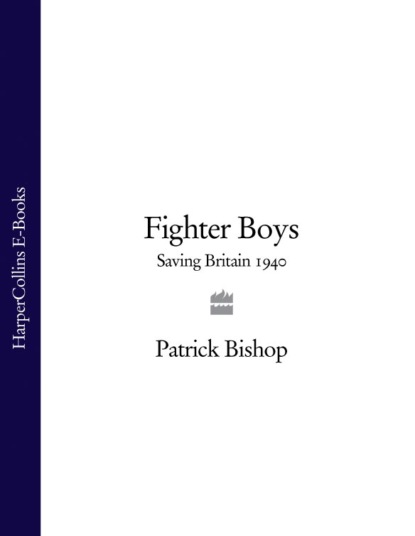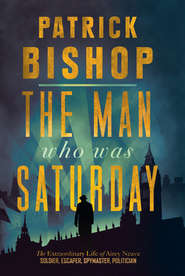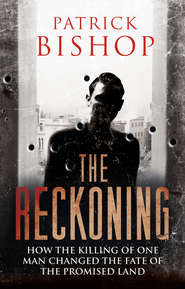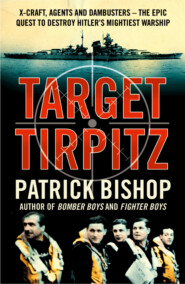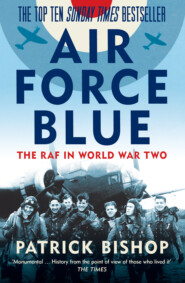По всем вопросам обращайтесь на: info@litportal.ru
(©) 2003-2024.
✖
Fighter Boys: Saving Britain 1940
Настройки чтения
Размер шрифта
Высота строк
Поля
(#litres_trial_promo)
Some pilots never fired at an aerial target before going into action. Tony Bartley, the son of a colonial service judge, who was awarded a short-service commission after leaving Stowe school, did his training before the war. Yet the first time he aimed his guns at a flying object was when he shot at an Me 109 in May 1940. George Unwin was fortunate in having Harry Broadhurst, an outstanding shot, as his flight commander. ‘Training in shooting was nonexistent. No one ever taught you how to shoot. But he did.’ Broadhurst emphasized ‘that the key to shooting was to get in close and the closer you got the more chance you had of hitting’. Unwin, who became a gunner instructor later in his career, found that one of the biggest weaknesses among fighter pilots at the beginning of the war was their inability properly to calculate how far they were from the aircraft they were attacking, often opening fire long before they reached what combat experience would teach was the optimum range of 250 yards. In the pre-war days, when aircraft were still equipped with a simple ring sight, Broadhurst taught his charges to work out the distance of the target by measuring it against the diameter of the circle. At 400 yards a bomber the size of a Wellington exactly filled the sight. At 250 yards, the ring was just outboard of the two engines. It was simple and effective, but according to Unwin never taught systematically.
The apparent explanation for the lack of firing practice was that, with tight financial restraints on the expansion programme, the Air Ministry had decided that spending money on the aircraft and pilots needed to man and equip the new squadrons took priority over new ranges, and so allowances for practice ammunition were cut to a minimum. There was no such excuse in 1940. By then shortage of time was to blame for a continuing failure to teach raw pilots how to shoot before throwing them into battle. When Archie Winskill, a softly spoken RAFVR volunteer from Cumberland, reached 72 Squadron at Biggin Hill on 4 October 1940, he was ‘well-schooled in formation flying and tactics but regrettably with no air-firing experience. I’d only fired my guns once into the sea off Liverpool…We knew nothing about deflection shooting.’
(#litres_trial_promo)
What was needed to attack successfully was the skill to manoeuvre into a favourable position, the ability to judge the correct range to open fire, and finally, and usually equally importantly, the knowledge of how to angle the shot so it stood the best chance of hitting the enemy aeroplane. The latter was deflection shooting. In all but full-on frontal or rear attacks, shooting in a straight line was useless. To strike the target required ‘laying off’, in the same way that a game shooter aims ahead of the pheasant so that the bird flies into the spread of pellets. The principle was recognized in the clay pigeon range installed at pre-war Tangmere and copied later in the war at many fighter bases. Some of the most deadly pilots, like Bob Tuck and Adolph Malan, attributed at least some of their success to their skill with shotguns. The importance of deflection shooting was obvious. Winskill was not to learn it until he was sent off to a gunnery course long after the 1940 crisis had passed.
The pilots of Fighter Command also went into the war with little idea of what they would be shooting at. George Unwin ‘didn’t know a thing’ about the Germans’ strengths, aircraft types and likely modus operandi before he met them in the air. At the time of Munich, the British air attache in Berlin made a tour of squadron bases and delivered a lecture about the Luftwaffe. But detailed intelligence briefings on the enemy were never given on an organized basis before the fighting began, and during the battles of 1940 pilots were seldom allowed a glimpse of the bigger picture. Their knowledge was confined to what had happened to them and their companions on the base, or what they heard on the radio. These shortcomings in training and preparation would only become fully apparent when revealed by the stresses of combat.
The approach of the cataclysm forced the pilots to think about the future. That the crisis was coming to a head seemed surprisingly comforting to some. Watching Europe’s tottering, somnambulistic progress once more towards the precipice induced feelings of restlessness and a desire to get the inevitable over with. Peter Townsend, who at the time of the Abyssinian war had been sickened by the thought of the effects of bombs on men, found the sight of the enemy, clear and unambiguous, was a liberation. ‘A complete change of mind and heart had by now come over me…My pacifism of the previous year had evaporated; I was becoming rather bellicose – at least as bloody-minded as every other Englishman felt towards the swaggering, bullying Germans.’
Townsend also noticed that the imminence of danger broke down whatever barriers remained between the new and the old RAF inside 43 Squadron, so that ‘in the growingly tense atmosphere, I was discovering that those parvenu pilots I had once so resented were really the warmest, most generous friends…genuine ‘fighter boys’, who lived for the shining hour, who did not take themselves seriously.’
(#litres_trial_promo)
The attitude cultivated by fighter pilots from the first days on the Western Front had been hedonistic, light-hearted, little concerned with events outside their world. This was to some extent genuine, to some extent affectation. Nobody now could be indifferent to what was happening in Europe. A number of the pilots had first-hand knowledge of the rise of fascism from time spent on the Continent. James Sanders, who was brought up in Italy, had once at the age of nine sung, with the school choir, the slaves’ chorus from Verdi’s Nabucco in front of Mussolini himself. This encounter had induced no sentiments of respect. Later he got into trouble at school for using squares of newspaper, bearing the Duce’s photograph, as lavatory paper. Billy Drake had been sent by his father, first to a German-speaking, then to a French-speaking school in Switzerland in preparation for a career in the hotel business. In the first establishment, ‘I was the only English boy and all my classmates were Germans or Italians. I got a bit fed up with their sniping at the British Empire all the time. I spoke to the housemaster and told him what was happening and told him I intended to challenge them to a boxing bout every time it happened with him as the referee. And so I was knocked down about twelve times.’
(#litres_trial_promo)
Pat Hancock was sixteen when, in 1935, he went to stay with a family near Hanover and attended the local school. ‘I saw enough of the German youth movement to know how strictly disciplined they were and how confident they were that they had a great role to play in the world.’ In the streets of Hanover he saw formations of troops marching everywhere. ‘They were cock of the walk…everything glistened. I thought, my goodness, these are people who are going to have a go, given an opportunity.’
(#litres_trial_promo)
During an air tour of Europe in the spring of 1935 Jeffrey Quill had stopped at Berlin. He wrote to his mother that he had arrived at Templehof ‘in the middle of a sort of Hendon Air Display – they shot red lights at us to stop us landing but I was hanged if I was going to float round the sky waiting for their air display to finish, so I landed in the middle of it. They were a bit annoyed at first, but as I couldn’t understand what they were saying I just laughed and they soon quietened down. They are much too serious up here.’
(#litres_trial_promo)
Tony Bartley decided to visit Germany after being told by the captain of his rugby team, an RAF officer, that war was inevitable. After leaving Stowe school he had joined a City accounting firm to learn the profession, but left after a year. What he saw in the Reich impressed him profoundly. In Frankfurt-on-Main, staying with acquaintances of his parents, he came across a middle-aged man with a shaven head in the city’s botanical gardens. He learned he was a distinguished Jew who had just been released from a concentration camp. He told him of his experiences and invited him home to meet his family. When Bartley informed his hosts, they were horrified and told him to sever the new friendship or return to Britain. When he asked for a reason, he was told that ‘their son, a Hitler Youth, would denounce his father to the Gestapo for harbouring a Jew fraternizer’.
(#litres_trial_promo)
Ben Bowring, who joined 600 Auxiliary Squadron in 1938, met Germans in Switzerland, where he was at school, and in America, where his father travelled for business, and later through friends in Britain. He ‘absolutely loathed them. I knew them socially and they were always asking me to fly over to Germany and one thing and another. I knew perfectly well by their attitude that they were a very cruel type of people…[They] had quick tempers and they thought they were masters of everything. Since I was something of an athlete, if I beat them at a game they were quite upset and quite likely they wouldn’t talk to you for a day or so. Or else if you beat them very badly they would come cringing to you on their knees (like) bullies, having been very unpleasant to you beforehand.’
(#litres_trial_promo)
The same unsporting tendencies were to strike Richard Hillary when he went with an Oxford boat crew to compete in Germany in July 1938 in the ‘General Goering Prize Fours’ at Bad Ems. The team’s attitude to the race appeared languid, an approach which annoyed their hosts.
Shortly before the race we walked down to the changing-rooms to get ready. All five German crews were lying flat on their backs on mattresses, great brown stupid-looking giants, taking deep breaths. It was all very impressive. I was getting out of my shirt when one of them came up and spoke to me, or rather harangued me, for I had no chance to say anything. He had been watching us, he said, and could only come to the conclusion that we were thoroughly representative of a decadent race. No German crew would dream of appearing so lackadaisical if rowing in England: they would train and they would win. Losing this race might not appear very important to us, but I could rest assured that the German people would not fail to notice and learn from our defeat.
The Oxford crew won, by two fifths of a second, and took home the cup, a gold shell-case mounted with a German eagle. ‘It was certainly an unpopular win,’ Hillary wrote afterwards. ‘Had we shown any enthusiasm or given any impression that we had trained they would have tolerated it, but as it was they showed merely a sullen resentment.’
(#litres_trial_promo)
Hillary subsequently saw the race as a metaphor for the coming conflict, a ‘surprisingly accurate pointer to the course of the war. We were quite untrained, lacked any form of organization and were really quite hopelessly casual’. This was a particularly British piece of mythologizing that was some distance from the truth. Hillary was fiercely competitive on the river, and the pilots of Fighter Command would turn out to be just as aggressive as their Luftwaffe counterparts. As for training, they had prepared for the war as hard as anybody. The problem was that much of the effort had been misdirected.
It was a question of image. The Fighter Boys, like the rowers, wanted to win, and took their superiority for granted. They would rather, though, that victory was attained without too much obvious exertion. The picture was of amused, easy-going Britons triumphing over robotic Germans. It was the view the pilots had taken of themselves and it was the way they wished to be seen. This, very soon, would come to pass.
It was true, however, that deep political thinking, let alone ideological conviction, was rare among the pilots. All the services had a tradition in which political enthusiasms were regarded as both unprofessional and socially undesirable. The RAF was different in that the majority of its members, the tradesmen and technicians, were from the ambitious upper working class or lower middle class and more inclined to question authority than their counterparts in the army. Junior officers could also be vocal about decisions by higher authority, especially where life-or-death matters concerning equipment or tactics were concerned, and the general conduct of the war would later sometimes be criticised.
At Cranwell, the debating society provided a formal arena for political discussion. In November 1938 the motion was that, ‘This House considers that an agreement with Germany is in the best interests of Great Britain and of the world at large.’ It was only narrowly defeated by thirty-six to thirty-four votes, after an intervention by a cadet who pointed out that ‘the persecution of the Jews precluded any decent-minded people from having anything to do with the Germans’.
(#litres_trial_promo)
Among the squadron pilots, though, domestic and international politics and the details of each crisis appear to have excited little interest. Billy Drake and the Tangmere pilots ‘bought a newspaper to look at the sporting events, that’s all. We didn’t read it to find out what Hitler was doing. The attitude in the mess was that the war was inevitable, so why talk about it?’
(#litres_trial_promo) Geoffrey Page’s recollection was that ‘pre-war and all through the war one never really discussed politics at all. It wasn’t an issue…Two subjects were taboo in an officers’ mess. You never talked politics and you never talked about the opposite sex.’ The first prohibition was more strictly observed than the second.
(#litres_trial_promo)
At Oxford, the University Air Squadron appears to have been gripped by the general sense of inexorability. By 1939 its members all assumed they were going to have to fight, despite the continuing optimistic noises being made by Chamberlain and his supporters. Individual political beliefs, where they were held at all, had become irrelevant. Richard Hillary was contemptuous of his bourgeois left-wing contemporaries and impressed but unconvinced by heartfelt pacifists. He and his contemporaries were perceived, he wrote, as superficially ‘selfish and egocentric without any Holy Grail in which we could lose ourselves’. The war, by offering up an unmistakable and worthwhile enemy, had provided it. Now they had ‘the opportunity to demonstrate in action our dislike of organized emotion and patriotism, the opportunity to prove to ourselves and the world that our effete veneer was not as deep as our dislike of interference, the opportunity to prove that, undisciplined though we might be, we were a match for Hitler’s dogma-fed youth’.
(#litres_trial_promo)
These were more complex sentiments than were felt by most of the pilots. Stephen Beaumont, notably decent and intelligent, was probably nearer the feelings of the majority when he reflected on the motives that had pushed himself and his upper middle class Yorkshire comrades to join the auxiliaries. ‘Old-fashioned patriotism? Desire to give back to the community something for their – at least in some cases – admittedly favoured social background? Dismay, turning to acute dislike even hatred of the bullying they came to see in Germany? A desire to fly? Probably all these things.’
(#litres_trial_promo)
The overseas pilots were moved by a simple sense of duty that must have seemed slightly anachronistic even in 1939. Asked later what he had been fighting for, Al Deere replied: ‘In my generation, as schoolboys, we always thought of [Britain] as the home country, always referred to it as the Mother Country. That was the old colonial tie…There was no question that if this country was threatened, New Zealanders wouldn’t go to war for Britain.’
(#litres_trial_promo) It was the same for Adolph ‘Sailor’ Malan, a South African ex-merchant navy officer who settled in Britain in 1935 and applied for a short-service commission. Malan’s voyages with the Union Castle line had taken him to Hamburg, where he ‘spent a lot of time talking to German harbour officials, sailors and civilians. Their attitude made me realize that war was inevitable.’
(#litres_trial_promo)
The pilots were joined by men who had no strong bonds natural with Britain, such as Billy Fiske, an upper-class American sportsman, captain of the US Olympic bobsled team, who volunteered two weeks after the outbreak of war. Several recruits came from Ireland. The fact that Eire was officially neutral and just emerging from a bitter independence struggle with Britain had made no difference to ‘Paddy’ Finucane, whose father had taken part in the 1916 Easter Rising, nor to John Ignatius ‘Killy’ Kilmartin, black-haired and sleekly handsome, who was to fight almost from the first day of the war to the last.
Acceptance, resignation, a certain thrilled apprehension seem to have been the predominant attitudes and emotions as the last days of peace slipped away. Not everyone answered the call of duty. In 609 Squadron one pilot decided to defect. He was, Stephen Beaumont recalled, ‘not a particularly attractive man…We felt no loss at his going.’ The squadron structure and the overwhelming importance of esprit meant that only the dedicated were welcome.
At Hornchurch, aircraft were now dispersed away from their hangars and along the far side of the airfield and tents put up to house the ground crews. A readiness system was introduced so that one shift of pilots was always dressed and ready to fly at short notice. It was to last until 1943 when the Luftwaffe no longer posed any serious threat to the country in daylight. Al Deere and the other pilots spent summer days stripped to the waist, filling sandbags to build the walls of U-shaped blast-protection pens that shielded their Spitfires. At Tangmere 1 Squadron and 43 Squadron skimmed their Hurricanes over the Channel waves, firing at splash targets with volleys from their Brownings that kicked up jagged white plumes and churned the water. The effect seemed devastating to old-timers brought up on the spindly fire-power of a single Lewis gun. ‘The noise is not so much a rat-a-tat as a continuous jarring explosion,’ wrote an RFC veteran.
(#litres_trial_promo) By night they climbed into the Sussex skies, suspended between the stars and the street lighting that provided bearings and allowed them to keep station in the pre-blackout era. On landing, the ground crews would pounce to rearm and refuel in minutes, practising the rapid turnarounds that would prove crucially important in the fighting to come.
It was not all work. Squadron Leader Lord Willoughby de Broke arrived with the other members of 605 Auxiliary Squadron at Tangmere and entertained at Tangmere Cottage, opposite the base. The pilots, Peter Townsend remembered, ‘spent wild evenings, drinking, singing, dancing to romantic tunes’, with ‘These Foolish Things’, the hit of the day, revolving eternally on the gramophone.
All around, though, the peacetime landscape was changing. The whitish aprons and parade grounds of Biggin Hill were covered in chippings in a vain attempt to disguise the station from the air. On several nights, the lights of London were extinguished in a trial to test the efficiency of the blackout. A pilot reported that the ground ‘looked like space inverted, just space with a few pinpricks of light like stars’. Barrage balloons wallowed in the air over town and suburb. The skies themselves were filled with ominous noises. In August, 200 bombers, fighters and reconnaissance aircraft appeared over London, Liverpool, Bristol, Birmingham, Manchester and Oxford, where they attracted the attention of RAF fighters and searchlight units. The aircraft were French, and the exercise intended as a test of Britain’s air defences, but few could have looked up without a frisson of apprehension.
Death moved a little closer. The Oxford University Air Squadron and RAFVR summer camp at Lympne in July was overshadowed by a midair collision in which Pilot Officer David Lewis, an experienced pilot who was flying solo in a Hawker Hind, crashed into a Gipsy Moth carrying a pupil and instructor from the Kent Flying School. All three were killed. It was, the OUAS log recorded ‘the first fatal accident in the squadron since it formed’.
Accidental deaths were commonplace, however, elsewhere in the air force, as pilots stalled, spun in, or flew into ‘clouds with a hard centre’ – hills obscured by fog. On one murky night at Biggin Hill, Flying Officer Olding was sent up to report on the state of a practice blackout in the Greater London area. Soon after take-off his engine seemed to cut out, then the pilots in the mess heard an explosion. A fire tender was ordered out, but fearing it would never be able to locate the wreckage in the foul weather, Flying Officer Woolaston took off, intending to drop a magnesium flare near the crash site. A few minutes later a second explosion was heard. His Hurricane was found a hundred yards from Olding’s, having flown into the top of Tatsfield Hill.
The effect of such events could be profound, but not necessarily lasting. Brian Kingcome was ordered to go and formally identify the body of a squadron pilot who crashed near Andover. He flew down and was met by a policeman who was concerned at the effect the sight of a mangled body might have on a healthy young man. ‘The body had been quite badly battered, he warned me, and I braced myself for the worst. Gently he drew back the sheet…I looked at the broken body and felt curiously unmoved…On my way back to Hornchurch I briefly wondered whether there was not a lesson here: whether I ought to be more careful, stick more closely to the rule books…’ The mood, though, ‘was short-lived’.
(#litres_trial_promo)
The number of fatal accidents inevitably increased as the 300 m.p.h. plus monoplanes, far harder to control than the biplanes, and in need of more room to recover if a mistake was made, were fed into the squadrons. At Tangmere, one pilot slid too slowly out of a turn and crashed in front of his comrades. Another time they watched as a pilot clipped the top of a tree coming in to land and burned to death before their eyes. Afterwards, Peter Townsend recorded ‘we had our own methods of restoring our morale. In the early hours of that morning, in the mess, we mourned our lost comrade in our own peculiar way, which smacked somewhat of the ritual of primitive tribesmen. Fred Rosier took his violin and to the tune of the can-can from Orpheus in the Underworld, we danced hilariously round the mess.’
(#litres_trial_promo)





